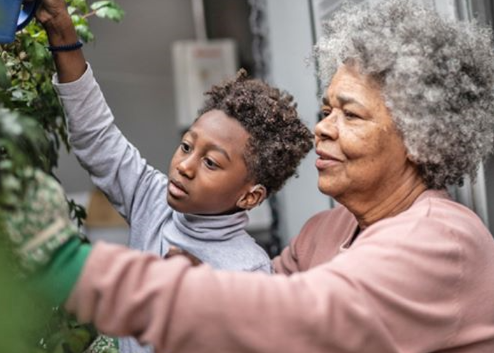BLACK FAMILIES involved in kinship care are at the sharp end of living with disparities and inadequate services for their needs, according to one charity worker who is aiming to make a difference.
Johanna Bernard, 61, is a carer for her two grandchildren and the co-founder of Families in Harmony — a specialist charity supporting African and Caribbean families in kinship care since 2001.
For Black families, looking after loved ones in need has been an unofficial cultural norm for generations. A Kinship carer, someone who is raising a child full-time who is not their birth child, needs to become common language in Black communities in addition to improved support.
The mother-of-two tells The Voice that her own journey into kinship care began after losing her son to knife crime in 2008 which has gone on to inspire the work she does with countless families.
“There were a lot of challenges for her [my grandson’s mother] as a mother and she had him at the age of 18. Very early on, I realised that there were significant issues around his upbringing,” she said. “I contacted social services to say if there were any concerns that I would want to be the first port of call. They said to me that he was already known to them.
“Two years after meeting her, there was a significant incident that happened at her home. The police were called and the children were taken away — and that’s when I stepped in.”

Kinship care can be triggered by various issues in families and is often “sudden and instant”. Families in Harmony work with families who have dealt with parents passing away to incarceration, mental health and substance abuse issues.
According to the Family Rights Group, there are 113,690 children in kinship care in England and 6.1 per cent of those children from Black British, Caribbean and African descent.
A further 8.1 per cent hail from mixed ethnic backgrounds. Bernard says she’s seen firsthand how African and Caribbean families are not receiving the culturally nuanced support from social services to look after kinship children.
Support
She says: “We have ECH (Education, Health and care) plans where children clearly need additional support. They may have cognitive functioning issues, or they may have ADHD. “These need to be addressed by a social worker or the school. Just putting forward families for this support, it’s a big challenge and a breakdown in trust.”
Bernard believes these fractured relationships between social services are a result of institutionalised racism and stigma, therefore Black families are already entering the process with scepticism. All potential kinship carers must also complete an assessment form which Bernard says is “Eurocentric” in its requirements for potential guardians.
African and Caribbean families face particular issues when it comes to kinship care. It is vital that the forthcoming Kinship Carers strategy acknowledges those issues
Andrew Gwynne MP
“It precludes some of the natural cultural behaviours that we have as African Caribbean people. For example, during the assessment there could be a child and in some African families, talking at the dinner table is not something that is acceptable. However, a social worker observing that may think the child was being neglected,” she explains.
In scenarios of a child speaking to an adult, they may avoid making eye contact as a form of respect and this could be interpreted as a child that is afraid. Bernard also says the kinship care system fails to understand how the legacy of slavery and migration show up in Black family structures, particularly for Caribbean families which could lead to harsher outcomes.
She says: “During slavery, when women’s babies were removed from them, we developed coping mechanisms in order to not be attached to our children. Because we knew that these children were not going to stay with us for very long.

“Over generational cycles, do we still have a little bit of that, in terms of how we mother our children, unconsciously or consciously?”
During the Windrush generation, many children were left behind in the Caribbean as their parents attempted to make a better life being sent. Known as “barrel children,” this generation can carry deep attachment wounds as they were raised by grandparents, aunts and uncles, and in some cases older siblings Families in Harmony specialise in dealing with this generational trauma that can often be overlooked and misunderstood by culturally misinformed social services through workshops and peer support among other kinship families.
Campaign
The charity, the only of its kind servicing Black families, is continuing to campaign for long-term policy change in the kinship care sector. Bernard says access to financial allowance to support kinship carers can be scarce if they take on loved ones without the involvement of social services as well as respite which would allow families emergency or temporary care.
Bernard, who remains as the kinship carer to her grandson, now 17, and her granddaughter, 13, says she wants to see more Black families engage in policy change in kinship care.
“We need to understand the cultural behaviours and how to engage with Black families, because many of the local authorities that we have worked with come knocking on the door and admit they’re not doing their best” she says. “Only two per cent engage in research, but research informs policy change.”
Speaking about the issue Labour MP Andrew Gwynne said: “African and Caribbean families face particular issues when it comes to kinship care. “It is vital that the forthcoming Kinship Carers strategy acknowledges those issues and brings forwards steps to tackle them. Whether it’s on data collection or including African and Caribbean kinship carers in co-creating training and support groups that address those specific needs, more can and must be done.”


Comments Form